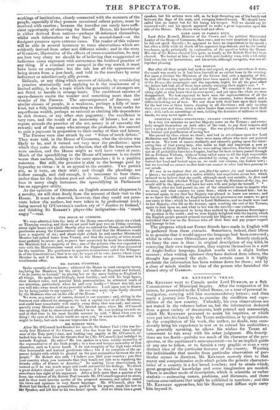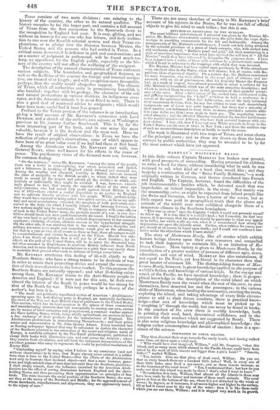MR. KENNEDY ' S TEXAS.
MR. KENNEDY went to Canada under Lord DURHAM, as a Sub Commissioner of Municipal Inquiry. After the resignation of his patron, he proceeded to the United States, on a tour of personal in vestigation, carrying with him recommendatory letters ; and then made a journey into Texas, to examine the condition and capabilities of the new country. Unluckily, his own observations are not stated in the volumes before us, but the information deduced from a great variety of documents, both printed and manuscript, which Mr. KENNEDY procured to assist his inquiries, or which were put into his hands by the Texan authorities, or by speculators. In the compilation of his work, the author, no doubt, may occasionally bring his experience to test or to extend his authorities ; but, generally speaking, he allows his wishes for Texan ad vancement to run away with his sober judgment. His descrip ' tions are too florid—partake too much of the character of the prospectus, or the auctioneer's announcement—to be an implicit guide or any one to follow, or to furnish a very graphic or even a very distinct idea of the particular features of the country. Wanting the individuality that results from particular observation of particular scenes or districts, Mr. KENNEDY scarcely rises to that massy and comprehensive style which paints the generic characteristics of a country in a few broad touches ; and to attain which, great geographical knowledge and some imagination are needed. There is another mode of description, which is scientific or rather statistic — embracing names, positions, and distances, and those various concomitants that might be exhibited in numbers ; and this Mr. KENNEDY approaches, but his fluency and diffuse style carry him beyond it. Texas consists of two main divisions ; one relating to the history of the country, the other to its natural qualities. The history occupies by far the larger part, and contains a full account of Texas from the first occupation by the Spaniards down to the recognition by England last year. It is easy, gliding, and not without an interest for any one who has leisure, and feels inclination to run over the Spanish colonial system and their Texan explorations, or to plunge into the disputes between Mexico, the United States, and the persons who had settled in Texas. In a critical sense, however, it is deficient in pith and condensation ; and as a matter of judgment in authorcraft, will be found much too long, we apprehend, for the English public, especially as the history of the country will not affect the wellbeing of the emigrant.
The description of the natural characteristics of Texas embraces various subjects. The boundaries and geographical features, as well as the facilities of the country for foreign and internal navigation, are treated of at length ; and with an opinion more favourable, perhaps, than the reality would altogether support. The climate of Texas, which all authorities unite in pronouncing beautiful, is also handled ; together with its geology, the character of the soil and natural productions in various districts, its indigenous creatures, and the domestic animals it is most fitted to rear. There is also a good deal of scattered advice to emigrants ; which would have been more useful had it been less general
Prefixed to the Texan portion of the volumes is an introduction, giving a brief account of Mr. KENNEDY'S connexion with Lord DURHAM, and a sketch of the author's own sojourn at Washington previous to his journey further Southward. This is by far the most interesting part of the book, and in one sense the most valuable, because it is the freshest and the most real. Here we have the result of original observations : in Texas we have the reflection of other people's observations, some of which appear to have been of no great value even if we had had them at first band.
Among the Americans whom Mr. KENNEDYmet with, was General SCOTT, since well known for his efforts in the cause of peace. The pacificatory views of the General were not, however, the common feeling.
"On the contrary," writes Mr. KENNEDY, "among the mass of the people, there was a levity in contemplating war which astonished and pained, and a bitterness in speaking of England which irritated and annoyed me. Among the wealthy and educated, hostility to British interests assumed the place of antipathy to the British people ; to whom indeed they were ready to accord all the respect and extend all the civilities to which collectively or individually they might be entitled. I was, however, exceedingly pleased to find, that among the superior officers of the army and navy—veterans who had served with credit against Great Britain in the war of 1812—there existed a cordial disposition to do justice to England and to cultivate friendly relations nith her people. While, professionally, they would have rejoiced at being called into active service, so far as my military and naval acquaintance extended, the members of both professions con curred in the hope (in which I heartily joined) that harmony between the two nations might long be maintained. While in company with some officers -drank in the United States' army, the probable results of a war, in case hostilities should break out, were good-humouredly discussed. I fought the battles -of my own land as gallantly as I could, without disparagement to her assumed opponent ; claiming, of course, ultimate success in the hypothetical struggle. On the other side, it was admitted that in the outset, superior discipline and military resources more ample and immediate would give us the advantage ; but that in a year or two, at all events in three or four, these advantages would be counterbalanced, and victory be secured to the Union. Should war take place, I am firmly of opinion that it will not be of short duration ; for its object, on the part of the United States, will be to lower the dictatorial tone too often assumed by Englishmen, to eradicate British influence from North America, and to raise domestic manufactures to a pitch that may enable them to maintain their ground afterwards in defiance of foreign competition."
Mr. KENNEDY attributes this feeling of ill.will chiefly to the Northern States; who have a strong reason to be desirous of war, in order to retain their protecting-duties and extend the consumption of their manufactures in the home market. To this purpose the Southern States are naturally opposed ; and what ill-feeling exists among them, Mr. KENNEDY traces to the Anti-Slavery people in America and England : if it were not for this sore, he feels convinced the interest of the South in peace would be too strong for that of the North for war. This may perhaps be a theory of the author's, but here it is.
" The small and politically repudiated section of American Abolitionists,' operating upon the Anti-Slavery party in England, are materially facilitating the views of the War and Anti-British class'of politicians in the United States. This section, which has its head-quarters in the sphere of those commercial and manufacturing interests that toil unweariedly to overtop our own, carries on, by means of hired emissaries and pamphleteers, a constant warfare against the Slave-holding States, which, being wholly agricultural, are anxious to have a free exchange of their products for the manufactures of England. The Abolitionists predominate in manufacturing Massachusetts ; and their prime orator and representative is Mr. John Quincy Adams. Every insulated fact or floating newspaper figment that may be calculated to darken the character of the Southern planters in the estimation of the moral and religious world of Europe, is carefully collected by the Pro-Tariff philanthropists, published in cheap little books with illustrative cuts, and sent across the Atlantic ; where they receive fresh circulation, and call forth the indignant denunciations of the excellent persons who essay to regenerate the world by periodical resolutions at Exeter Hall.
"Contenting myself by saying, what I believe in my conscience (and not without observation) to be true, that Negro slavery never existed in a milder form than it does in the United States—that the efforts of the Abolitionists tend only to frustrate their declared object—and that a more humane, generous, and high-minded class of men does not exist than the Southern planters— I shall simply remark, that the influence exercised by the American Abolitionists has the effect of sowing dissensions between England and the slaveholding States, and thus preventing their approximation on principles of free trade. The more insecure the social position of the Southern States, the more are they at the mercy of the Northern and Middle ; for the aggrandizement of whose merchants, manufacturers, and shipowners, they are oppressively taxed, to the injury of ours." There are not many sketches of society in Mr. KENNEDY'S brief account of his sojourn in the States, for he was too full of official objects to give his mind to such trifles ; but this is one.
REPUBLICAN RESISTANCE TO TUE RUSSIANS.
The most brilliant entertainment I attended was given by the Russian Minister, Mr. Bodisco; who certainly carried away the palm from the corps diplo=calque in providing amusements for the fair and fashionable. Among the arrangements of Mr. Bodisco's establishment, I could not help being attracted. by the splendid garniture of a posse of black servants, who, with cocked hats and vestments stiff with " Barbaric pearl and gold," did their ministering in a style of conscious importance that must have rejoiced the self-love of " All the Russia," could they have witnessed by delegation the gorgeous show. I have been tempted into a notice of these sable servitors by a characteristic anecdote, which I heard in reference to the trappings with which they were invested. The Russian Minister had been waited upon previously by White attendants —an excellent class in the States, n-hen well chosen ; but, of course, with Republican ideas of personal dignity. On a certain day, Mr. Bodisco summoned. his male domestics, who were attired in the usual garb of citizens, and announced, with an air of graciousness, that his Imperial Master the Emperor had, as a mark of respect, been pleased personally to select a uniform for his (the Minister's) household, which was of the most attractive description ; and. which he invited them to examine, in full persuasion of their grateful acceptance of the same. After a brief survey of the cocked hats, emblazoned coats, and gldiving inexpressibles, the " helps " withdrew to hold a conference in a corner of the apartment. After due deliberation, one of the body intimated their unanimous decision, that, for any free citizen to wear such mountebank equipments out of doors was quite impossible; but there was a minority of their number not indisposed to wear them in-doors, provided a suitable addition (one dollar per diem) were made to their pay. The ne,,rotiation terminated abruptly; and the offended Minister transferred the insulted habiliments to the readily-acquiescent Africans, who bore their sartorial honours with evident elation. I may add, that I have not seen White servants in livery in the United States, except once or twice in New York ; and there the uniform was of such an unostentatious description as hardly to merit the name.
The work is illustrated with two maps of Texas, and some charts of the principal ports ; and as these are drawn up from the latest surveys by public authorities, they may be assumed to be by far the most correct which have yet appeared.



























 Previous page
Previous page